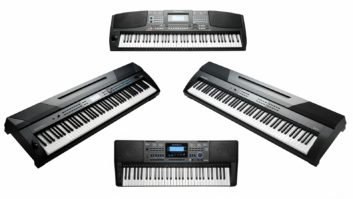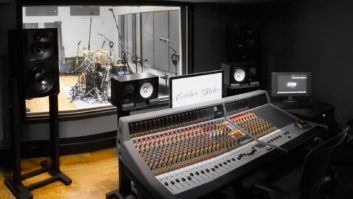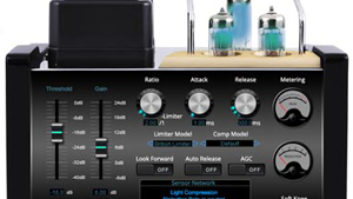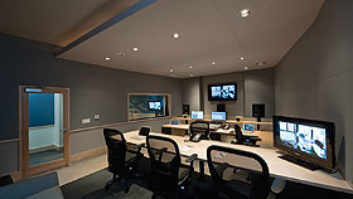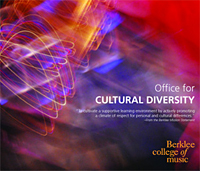
The November issue of Mix includes our annual look at the state of audio education. You’ll find photos new studios and equipment installs within schools, and information on the new ways that audio programs are meeting the needs of a student population that includes growing contingents of music-performance students and future freelancers.
One of the meaningful program additions that we uncovered while researching education stories is happening at Berklee College of Music, where educators and technology providers have developed a new lab and course of study for the College’s blind music and audio students. Kevin Johnson, Multicultural Educator/Program Manager with Berklee’s Office for Cultural Diversity, filled us in.
What was the impetus behind creating a special lab for blind students?
The needs of the students. Berklee is a Mac environment. We don’t have any PCs here for anything. So, blind students would come in with their own PCs fully loaded from their home state or country with the software that they could utilize. The problem has been that up until the most recent MacBooks, Macs have not been accessible to these students; there was no text reader or voice-over that would read the screen to them, so Macs were essentially useless to them.
How many blind students are enrolled right now?
We have 10 or 11 students as of this fall.
Have you always had an educational component for them?
We’ve had nothing before this; I’m embarrassed to say this, because I personally am a disabled advocate. I’ve worked in the disabled community for years, and when I got to Berklee three years ago, I was at a loss. The curriculum was creating more barriers to their learning.
These students have to take all the same basic music technology courses as other students, but they couldn’t access any of the information because they couldn’t use the software. You’re setting them up for failure, because they’re going to then be asked to create projects based on software they can’t use.
In designing the lab, we first asked the students what they needed and wanted. We also had a Blind Music Technology Summit, where we invited Mike Mandel, who is a Berklee alum and who is also blind. He’s a music producer and writer in New York City, and he is pretty savvy with modern recording technology. We talked with him and other folks about what they thought would be best to help these students, and it became clear early on that Macs weren’t going to be a viable alternative yet. That will come on in the next year or two.
For now, Sibelius and SONAR are the two primary modes for blind students to utilize in terms of recording and engineering. And the students were clear that they wanted to be able to take more of the basic music technology courses we teach here at Berklee, but focused more on the programs they can utilize.
The other question we asked had to do with whether Braille music should be a component, because that can be very helpful for ear training and dictation. This raises a real mixed issue, even in the blind musicians’ community. If I’m a blind musician and I go to a gig in New York City, no one’s going to hand me a lead sheet in Braille, so the majority of working musicians are doing everything by ear and practice. There are some in the blind community, who think everyone should learn Braille music, but there are also limitations there in terms of resources; not everyone has access to learn Braille music. Most blind folks do have access to Braille literature, but in terms of being able to spend time and be taught, Braille music is difficult for most folks.
Are most of the blind students in this program technology-focused, or are they music performance majors?
These students are Berklee students, period. Everyone has to play an instrument to come to Berklee. Most of the blind students are in performance, but even if you’re a performance major here, you have to learn engineering and recording and the technology that coincides with that. You’re going to be asked to create projects in those schools. These weren’t specifically engineering students, but they’re being asked to do that throughout their courses.
The idea is that in the morning students will do the blind-music-technology stuff— learning the basics of Braille music along with getting the basics of Sibelius and SONAR—and in the afternoon and evening, do their performance courses, so they’ll be just like all other students.
The gentleman who teaching the course workshops for blind students is Chi Kim. He’s a Berklee alumnus from Korea who also has been working in New York in the industry, primarily on music for TV and indie films. Mike Mandel and Chi Kim were really instrumental in designing what the most important pieces of this program are.
How does a program like this get funded?
The seed money for this came directly from the president’s office. After meeting with students and some of the folks we consulted with, we put together a proposal and gave it to the president, and he gave us about $20,000 for the software and some of the hardware, which was just enough to get us off the ground.
We also had help from Special Programs here at Berklee, which piloted this program as a five-week summer program. They were instrumental in paying for Chi Kim’s time. In the future, I think we’re looking at some private donations and possibly some grants. We’re also working in collaboration with the Perkins School for the Blind.
Would you say you’re preparing your blind students for the same types of careers as your seeing students?
Ultimately, we’re trying to produce members of the global music community. The purpose of this particular project was to level the playing field. We were accepting blind students and not really giving them the tools they needed to learn the same skills in terms of technology that other students were learning. I think generally, we want our students to be well-rounded individuals, and to have a solid foundation in music theory. But we also want them to have some business acumen and be able to adapt to the changing industry—to have an entrepreneurial spirit and make a living and a life whether they decided to stay in music or go onto something else. This was a way to help students who really hadn’t been served to be able to do that.
Visit Berklee College of Music’s Office for Cultural Diversity online at www.berklee.edu/diversity.
